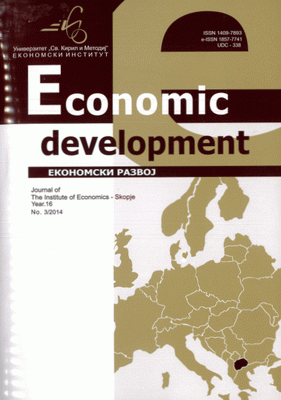Economic growth and unemployment: an empirical analysis (a case study on the Republic of Macedonia)
Economic growth and unemployment: an empirical analysis (a case study on the Republic of Macedonia)
Author(s): Elizabeta Dzambaska , Aleksandra LozanoskaSubject(s): Economy
Published by: Економски институт - Скопје
Keywords: economic growth, unemployment rate, Okun’s law, regression, employment policy
Summary/Abstract: It is a widely accepted view in economics that the GDP growth rate increases employment and reduces unemployment. The theoretical proposition relating output and unemployment is called “Okun’s Law”. This relation is among the most famous in the macroeconomics theory and it holds for numerous countries and regions, especially for the developed ones.This research investigates the relationship between unemployment and economic growth in the Republic of Macedonia through the implementation of Okun’s law. Using quarterly data covering the period 2005 – 2012, and time series techniques and linear regression between unemployment and economic growth, the empirical analysis shows that a rise of one percentage point of unemployment is associated with a decline of roughly 1.6 percentage points of real GDP growth. The regression also shows that only 17.2% of the changes in the GDP can be explained with the changes in the unemployment. Therefore it can be concluded that the Okun’s concept is not totally prominent for the Macedonian economy.
Journal: Економски Развој - Economic Development
- Issue Year: 16/2014
- Issue No: 3
- Page Range: 153-169
- Page Count: 17
- Language: English

